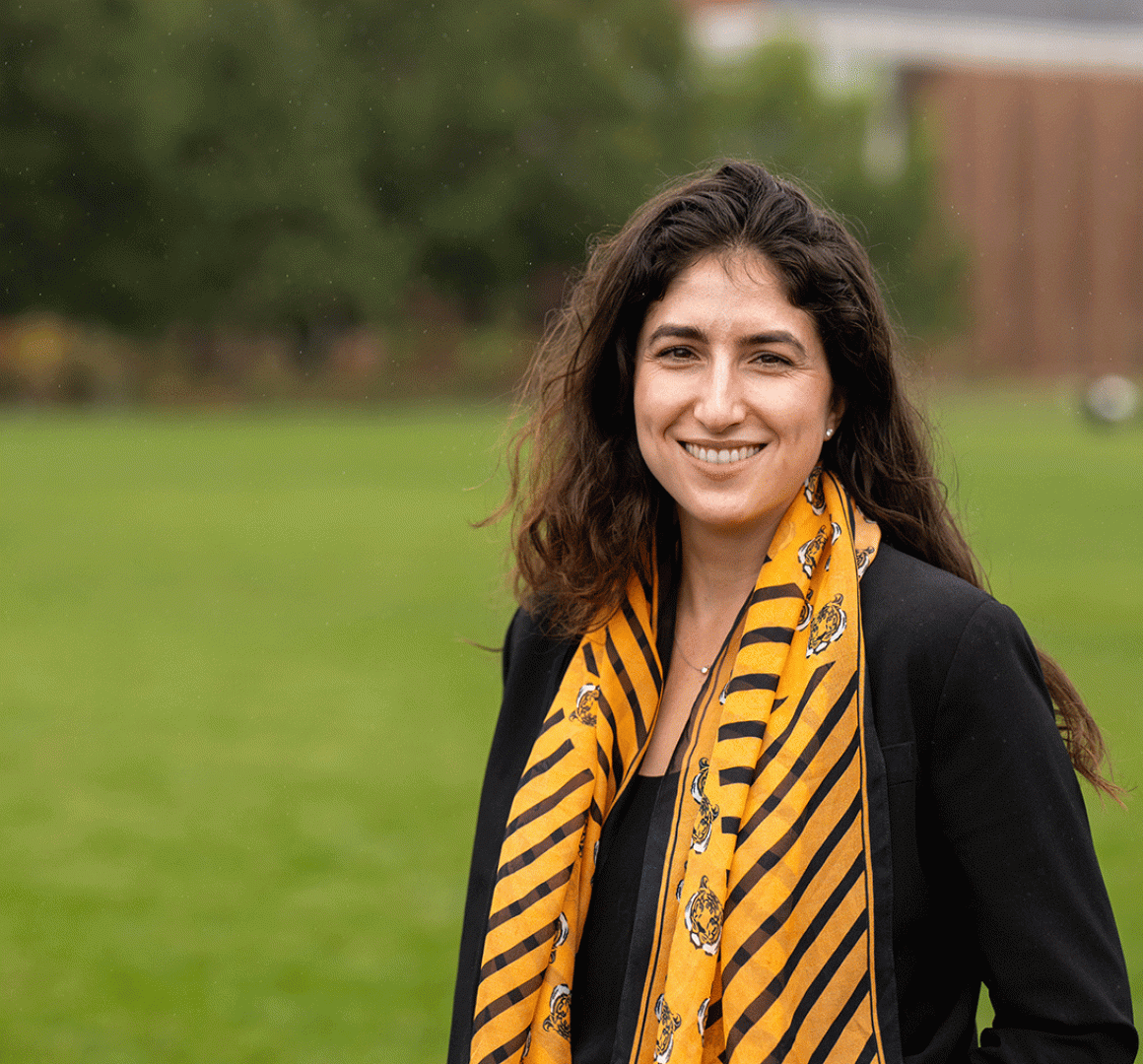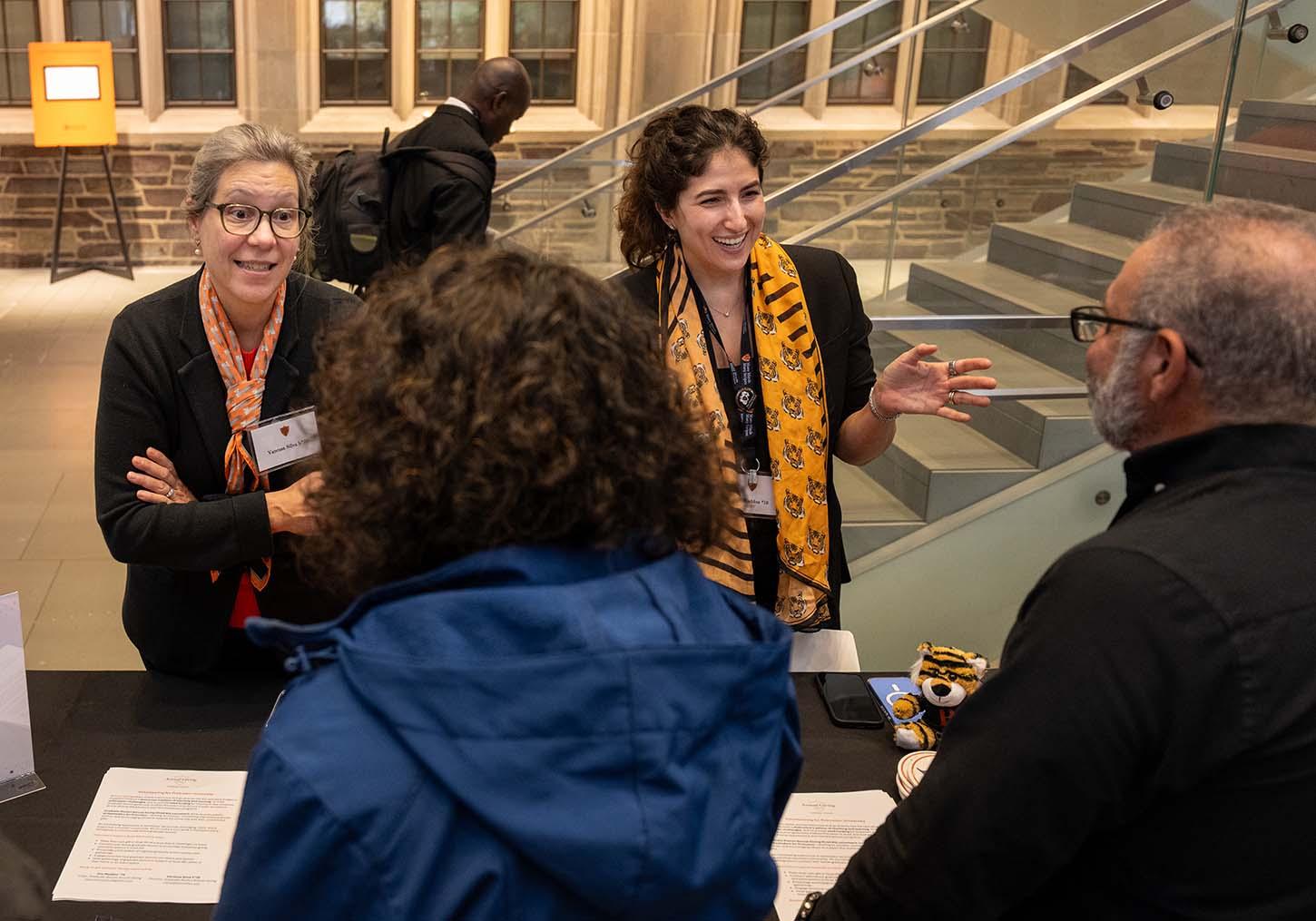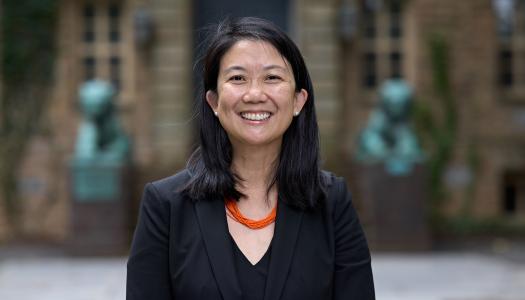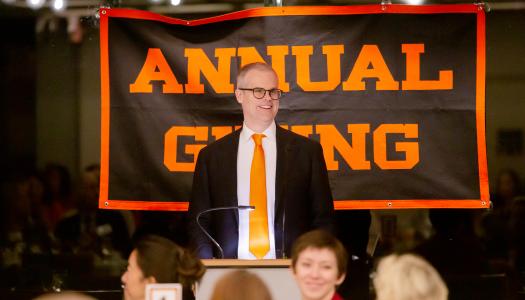Zoe Maddox *18 guides Graduate School alumni to engagement through Annual Giving

photo by Photo by Sameer A. Khan/Fotobuddy
Zoe Maddox *18 stood behind a small table in the Louis A. Simpson Building’s Weickart Atrium, greeting some of the hundreds of graduate alumni who had returned to campus for the “Many Minds, Many Stripes: A Princeton University Conference Celebrating Graduate Alumni” in October. Amid three days of illuminating panel discussions, faculty lectures and social events, she was feeling relaxed at the conference “engagement fair,” as alumni reenergized with donuts and apple cider and explored ways they could stay involved with Princeton after they returned home.
Maddox, visiting from her home in Arkansas, made connections and shared ideas. Since July, she has been chair of Graduate Alumni Annual Giving.
“What I want graduate alumni to know is that Princeton is waiting to embrace you if you let it,” Maddox said as she welcomed fellow graduates in her new role. “There are so many ways to get involved. You can give to Annual Giving each year and have that be your touchpoint. You can volunteer for Annual Giving and share the message of the importance of this unrestricted funding with fellow alums. You can choose to serve as a mentor in GradFUTURES. You can get involved with APGA [the Association of Princeton Graduate Alumni]. There are all of these vectors that I think maybe many grad alums don’t know about.”
Unrestricted Annual Giving from undergraduate and graduate alumni, parents and friends helps provide the margin of excellence that makes a Princeton education second to none. Annual Giving contributes to graduate student fellowships and stipends, helps recruit leading professors and researchers, enriches a vibrant graduate student experience and supports academic and service programs. Maddox herself has participated in Graduate Alumni Annual Giving every year since receiving her degree and was thrilled when she was asked to help lead it.
“Graduate Alumni Annual Giving is such a privilege to champion,” she said. “What I love most about volunteering is the opportunity to connect with graduate alumni all over the world. I get to hear how Princeton shaped their lives — often in profound, deeply personal ways —and I’m reminded that our collective generosity sustains that same transformative experience for today’s and tomorrow’s students.”
Maddox’s ongoing bond with Princeton was forged during her five years as a graduate student. She attended UCLA as an undergraduate and her history professor Teofilo Ruiz *74, who had received his Ph.D. in history from Princeton, shared many stories about his excellent graduate school experience. “His stories were bolstered by other faculty members, [who shared] really positive feedback about a Princeton graduate degree,” she said.
She arrived at Princeton in 2013 to study French history and became a regular chaperone for a program that takes undergraduate history students and ROTC cadets to D-Day battlefield tours in Normandy. “I just fell in love with that region and started to shape my research questions around it,” she said. Her Ph.D. dissertation was titled “Corpses, Cemeteries, Commemoration: Normandy from the Liberation to the 1960s,” a study of the memory and meaning of the 1944 battle, an Allied victory that began the final demise of Nazi Germany.
While she loved academia and being a history scholar, Maddox took an alternate career path with the Princeton University Investment Company (PRINCO), which “planted seeds of what became my work with Graduate Alumni Annual Giving,” she said. “They gave me a master class in endowment stewardship. The endowment isn’t a pool of cash to be drawn from freely; it’s an investment portfolio whose health depends on disciplined management and long-term perspective,” Maddox said. “That’s what makes unrestricted Graduate Alumni Annual Giving so vital, because it gives University leaders the flexibility to meet emerging needs and pursue new opportunities quickly.”
In 2020, Maddox signed on to be an Alumni Schools Committee ambassador and interview prospective Princeton students. She also volunteered with Graduate Alumni Annual Giving and was asked to join the Dean’s Leadership Council, which provides guidance to the dean of the Graduate School.

Then, as the COVID-19 pandemic began, she took time during the summer of 2020 to explore the United States with some friends from Princeton. “When we drove through Arkansas, I got goosebumps,” she said. “I thought it was the most beautiful place I had ever seen. I made the decision to move there and build my life there. I didn’t know anybody in Arkansas. I didn’t have a job in Arkansas. It was purely this gut feeling.”
In Arkansas, she worked in finance and higher education before starting this year at Heartland Forward, a “think-and-do tank” in Bentonville that promotes economic growth and opportunity in 20 American “heartland” states. She directs the organization’s Maternal and Child Health Center for Policy and Practice, working to unite policymakers, providers and communities to close disparities, expand access to care and improve health outcomes for mothers and families. “One thing that I’m particularly proud of is serving not only as an ambassador of Princeton, but also being an ambassador for Arkansas,” she said.
At the “Many Minds” conference, Maddox was called upon to give introductory remarks for a lecture by Vincent Poor *77, the Michael Henry Strater University Professor in Princeton’s Department of Electrical and Computer Engineering. She spoke about witnessing the previous “Many Minds,” in September 2013, when she had just arrived on campus as a first-year grad student.
“I recall watching all the festivities from a distance, feeling that the alumni gathered then were on the other side of a mountain I was only beginning to climb,” she told the lecture attendees.
Now she was among them as a peer. At the “Many Minds” engagement fair, she connected with other graduate alumni who were eager to strengthen their own Princeton bonds.
“For some who returned to campus after years away, it was remarkable for them to see how far graduate-student life has evolved. Richer programs, stronger community and support, a renewed sense of belonging,” she said.
“One highlight for me at the Annual Giving table was meeting a 2025 grad alum from my own department — history — and seeing even a freshly minted Princeton Ph.D. express an interest in giving back to the University.”


